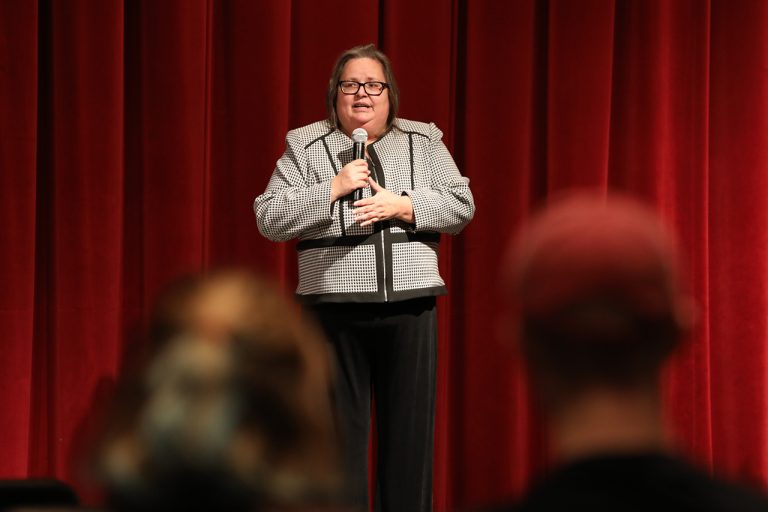


Published on March 14, 2019
 Evelyn Mantilla, a former member of the Connecticut House of Representatives, visited Eastern Connecticut State University on March 6 to discuss her experience as the first openly bisexual legislator in the nation. Mantilla is committed to advocating for underrepresented groups and encouraging others to become involved in politics.
Evelyn Mantilla, a former member of the Connecticut House of Representatives, visited Eastern Connecticut State University on March 6 to discuss her experience as the first openly bisexual legislator in the nation. Mantilla is committed to advocating for underrepresented groups and encouraging others to become involved in politics.
Before beginning her career as a state representative, Mantilla experienced setbacks that highlighted the importance of perseverance. During her initial run for office, she was thought to have won by five votes, which called for an automatic recount. She actually lost by 16 votes. “Every vote really does count,” she said.
Moreover, Mantilla was especially inspired to campaign again after being dismissed by another politician, a Puerto Rican man who had ties to law enforcement and used the position to his advantage. Born in Puerto Rico herself, Mantilla felt that she had to intervene. “I didn’t like the way he was representing my community, so I decided to challenge him.”
While Mantilla had more than 100 volunteers on her team, they were threatened and harassed by people working for the opponent. Despite their efforts, she lost a second time. “We celebrated because we were proud of what we did,” she stated. However, the man who beat her was convicted of voter fraud, and Mantilla received a third chance. She petitioned to be on the next ballot, and was finally elected in 1997.
“When I ran, I was not open about my sexuality,” she revealed, though she was in a committed relationship with a woman. “I realized that there was a big part of me that I was not bringing to that new table.” At a LGBT pride event in Hartford, Mantilla made a speech in which she not only declared her bisexuality, but also proposed to her partner in front of everybody. “I proposed marriage, in public, in the shadow of the State Capitol.” Feedback was mainly positive.
Nevertheless, Mantilla and her partner soon considered the safety risks that came with such overt vulnerability. With their lives exposed, they were occasionally nervous to leave the house, but found strength in support from those around them. “There were people in our community who we knew weren’t just going to be accepting, but encouraging.”
Still, as Mantilla had suspected, encouragement was not shown by all. When she strived for re-election, one Pentecostal minister ran a homophobic campaign against her, utilizing derogatory terms on posters and general hate speech to sway voters. Mantilla went about her business, running a “normal, door-to-door campaign,” and proved successful in the face of adversaries. She was re-elected with 88 percent of the vote.
During her role as a legislator, she acted as a resident “social worker” in lower socioeconomic areas, attuned to their most pressing needs and vocalizing them. She was able to work on the issue of same-sex marriage, along with contributing to election reform. “I really wanted to level the playing field,” said Mantilla. She stressed the significance of forcing combatants to collaborate with outcast groups “in all of their identities” and emphasized the effectiveness of connecting on a human level.
“I’ve remained involved professionally and as an activist,” she said of her time spent away from the House of Representatives. Her final term expired in 2007. Urging the audience to run for office, Mantilla pointed out that there is not enough minority representation and, consequently, not enough diverse opinions active in government. She promoted getting involved locally in addition to speaking with somebody like herself on how to approach a campaign. “You simply have to have knowledge of your community.”
Mantilla concluded: “Some of the simplest things carry you through in the end.” She cited familial support and focusing on successes rather than failures as means of pushing through to accomplish goals, particularly in politics. “There is nothing more powerful than bringing yourself to a table you have fought for.”
Written by Jordan Corey